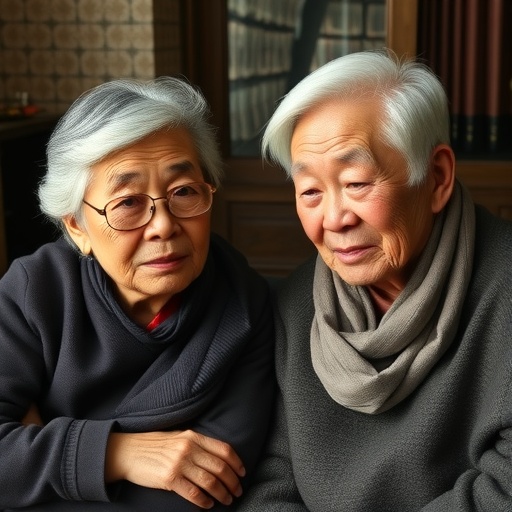In recent years, the mental health of migrant populations has drawn increasing attention from social scientists and psychologists alike. A groundbreaking study recently published in BMC Psychology has shed light on a particularly vulnerable demographic: migrant Chinese grandparents. This research explores the complex interplay between depressive symptoms and intergenerational family conflicts among this group, employing a sophisticated moderated mediation model to unravel the psychological mechanisms at work. The study not only deepens our understanding of the mental health challenges faced by elderly migrants but also underscores the role of familial relationships as both a source of stress and potential support.
The study’s primary focus is on depressive symptoms experienced by Chinese grandparents who have migrated to urban environments, often to assist in caring for grandchildren while their adult children work. This demographic shift is emblematic of broader migration patterns fueled by rapid urbanization and economic development in China. However, despite the practical benefits of co-residence and childcare, these grandparents frequently encounter intergenerational friction. Such conflicts may arise from differing values, communication barriers, and role expectations between grandparents and their adult children or grandchildren.
Employing a moderated mediation model allows the researchers to tease apart not just whether family conflict contributes to depression, but how this relationship is mediated by other psychological processes and moderated by contextual factors. For instance, the model probes whether the impact of conflict on depressive symptoms is channeled through feelings of social isolation or perceived stress, and how variables like social support or resilience alter this pathway. This methodological approach enables a nuanced analysis beyond simple cause-effect relationships, reflecting the complexities of real-life family dynamics.
The psychological landscape these migrant grandparents navigate is often fraught with identity challenges. Having migrated from rural to urban areas, they must reconcile their traditional cultural values with the rapid modernization embraced by their younger family members. Such cultural dissonance often manifests in misunderstandings and frustration, which can escalate into conflicts. For the elderly, these tensions are doubly painful as they strive to maintain family cohesion while confronting their own diminished agency and social roles within the household.
Moreover, the research highlights how depressive symptoms among these grandparents may be exacerbated by their limited access to mental health resources. Often isolated linguistically and socially, migrant elders might be reluctant or unable to seek professional help. The stigma surrounding mental health in many communities further compounds this issue. As a result, family conflicts may become a silent trigger, worsening depressive symptoms without intervention.
From a clinical psychology perspective, these findings have far-reaching implications. Understanding the pathways linking intergenerational conflict to depression can inform targeted interventions that address both individual coping strategies and family communication patterns. Mental health professionals working with migrant families might incorporate culturally sensitive counseling that acknowledges traditional values while fostering adaptive negotiation of intergenerational roles.
On a societal level, this study emphasizes the necessity of social policies that support the mental well-being of elderly migrants. Programs designed to reduce social isolation, enhance community engagement, and provide accessible mental health services could mitigate the psychological burden borne by this population. Furthermore, public awareness campaigns aimed at destigmatizing mental health issues in migrant communities could encourage more proactive help-seeking behaviors.
The moderated mediation framework employed in this research also opens avenues for future studies. For instance, exploring potential moderators such as socioeconomic status, gender, or length of residence could reveal differential vulnerabilities or resilience factors within the migrant grandparent cohort. Additionally, longitudinal research could track how depressive symptoms and family conflicts evolve over time and under varying socio-economic conditions.
In essence, this study situates mental health concerns within the broader socio-cultural and familial context of Chinese migrant grandparents, rather than treating depressive symptoms in isolation. The recognition that family conflict operates through mediating and moderating factors underlines the complexity of psychological health in migrant populations. It challenges both clinicians and policymakers to adopt holistic approaches that integrate individual, familial, and societal dimensions.
The implications extend beyond the Chinese context globally, as many countries experience similar migration patterns and demographic shifts. Elderly migrants worldwide face comparable issues of cultural adjustment, social isolation, and role changes within family systems. This research, therefore, contributes valuable insights that may inform international mental health strategies for aging migrant populations.
Furthermore, the study’s robust methodological design enhances its scientific contribution. By integrating moderated mediation analysis, the researchers provide a model that can be adapted and tested in various cultural settings. This versatility enriches the psychological literature on aging, migration, and mental health, offering a template for complex causal inquiries in social science research.
In conclusion, the intricate relationship between depressive symptoms and intergenerational family conflict among migrant Chinese grandparents reveals a pressing mental health challenge compounded by cultural, social, and structural factors. Addressing this issue demands multidisciplinary collaboration among researchers, clinicians, social workers, and policymakers to build supportive environments that foster psychological resilience and family harmony. As the global population ages and migratory flows continue, understanding and supporting the mental well-being of elderly migrants becomes an urgent priority for societies worldwide.
Subject of Research: Depressive symptoms among migrant Chinese grandparents and their relation to intergenerational family conflict, analyzed through a moderated mediation model.
Article Title: Depressive symptoms among migrant Chinese grandparents and intergenerational family conflict: a moderated mediation model.
Article References:
Su, H., Chao, Y. & Wang, Z. Depressive symptoms among migrant Chinese grandparents and intergenerational family conflict: a moderated mediation model. BMC Psychol 13, 1219 (2025). https://doi.org/10.1186/s40359-025-03540-z
Image Credits: AI Generated




